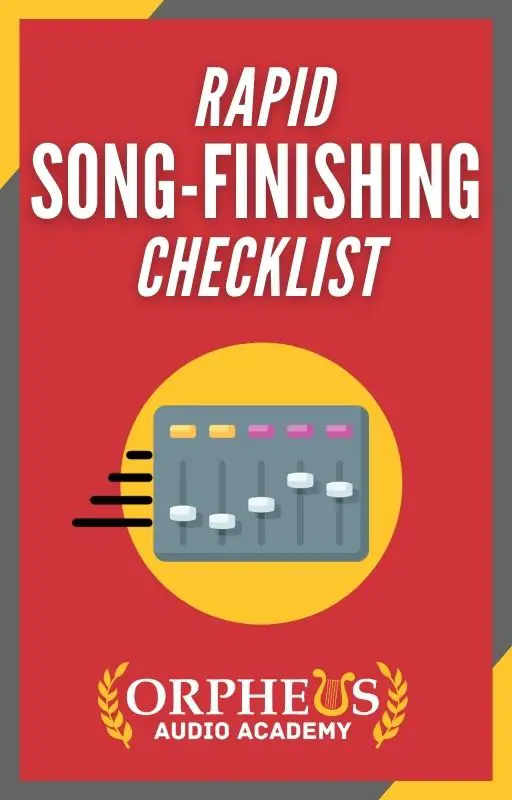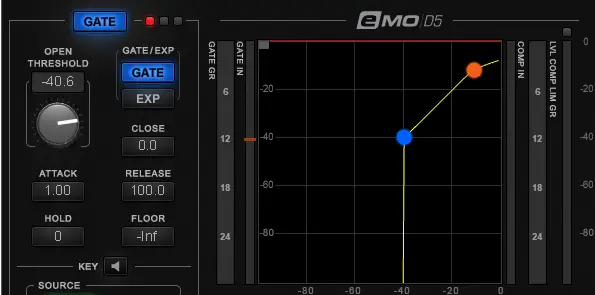What exactly is a noise gate, and how and when do you use one?
A Noise Gate (also a type of Expander) is an amplifier whose output gain reduces as input gain (dB) reduces. Once the volume of a signal falls beneath a user-defined threshold, the noise gate will then turn down the volume of the signal further.
In other words, a noise gate silences a track once its volume falls below a set threshold.
Noise gates are often used to attenuate or reduce the level of noise in a signal.
Noise gates are also often confused with compressors, but they have very different functions. In this article, we will discuss what a noise gate is used for, the best audio situations for using one, and how it differs from a compressor.

Create Better Songs, Faster
Click below to download my free song-finishing checklist to help you create radio-ready songs without taking months to complete them.
What is a noise gate?

Once signal level falls below the blue dot, the volume is completely turned down.
A Noise Gate) is an amplifier whose output gain reduces as input gain (dB) reduces.
It works by cutting off the signal below a certain threshold, so any background noise that falls below this value will not be heard. This can be especially helpful for recording applications where unwanted noise from mechanical sources such as air conditioners and traffic can interfere with the desired audio content.
When To Use A Noise Gate?
The best audio situations for using a noise gate are when there is low-level background noise that needs to be removed from the signal without affecting other parts of the signal.
1. Eliminate Background Noise
For example, if you are recording vocals and want to eliminate wind or room hum but don't want to affect other dynamic elements in the track, a noise gate might be beneficial.
2. Remove Noise Floors
Gates are also a great tool for distorted electric guitars, as the amp may create a constant noise floor which is present even when the guitar isn't playing. A noise gate can eliminate this noise when the guitar isn't present in the mix.
3. Reduce Headphone or Mic Bleed
Another great use of the noise gate is to reduce the amount of bleed in a signal. Bleed occurs when audio signals from multiple sources get mixed together, resulting in an undesirable muddiness. A noise gate can cut out this unwanted bleed and keep only what is desirable in the mix.
Noise Gate vs Expander vs Compressor vs Limiter
It’s important to note that there is a big difference between what a noise gate, expander, compressor, and limiter do.
Expander
An expander increases the dynamic range of source. Louder and quieter parts become relatively louder and quieter respectively. It's essentially the opposite of a compressor.
Expanders come in two forms:
“Upward expanders” amplify the level of signal that passes the threshold, rather than attenuate it like a “downward compressor.” A “downward expander” attenuates signal that drops below the threshold.
Thus, a noise gate is also a downward expander. Put another way, a noise gate is a type of expander.
Compressor
An amplifier whose output gain (dB) reduces as input gain (dB) increases. Low volumes are raised while high volumes are reduced.
A compressor whose input source is frequency, not amplitude, is called a "De-Esser".
You can check out my guide to De-Essing vocals here.
A compressor is essentially opposite of an expander, as it reduces dynamic range.
Limiter
A limiter is an amplifier whose output gain (dB) has a volume limit that remains the same regardless of its input level.
A limiter sets a volume "ceiling" at which signal cannot pass. If the signal hits this ceiling, it will be heavily compressed so that it does not pass above.
Noise Gate
An amplifier who's output gain reduces as input gain (dB) reduces.
A noise gate is a form of "downward" expansion.
Expander
An expander increases the dynamic range of source. Louder and quieter parts become relatively louder and quieter respectively. It's essentially the opposite of a compressor.
Compressor
An amplifier whose output gain (dB) reduces as input gain (dB) increases. Low volumes are raised while high volumes are reduced.
Limiter
A limiter sets a volume "ceiling" at which signal cannot pass. If the signal hits this ceiling, it will be heavily compressed so that it does not pass above.
Where should you put your noise gate?
The best place to put your noise gate is in the chain of effects before the compressor or equalizer. This allows you to reduce any unwanted background noise and had gain control of what you want to hear in the mix, allowing for better clarity and depth.
Knowing what a noise gate is used for, what situations they are best used in, how they differ from compressors or expanders, and where to put them in your chain of effects will help you get better results from your recordings and mixes. With the right knowledge and application of noise gates, you can take your audio production to the next level!
Finish More Radio-Worthy Songs, Faster!
Recording clean tracks is just one piece of the puzzle when it comes to producing pro-quality songs.
If you want a proven step-by-step formula for mixing radio-worthy tracks from start-to-finish...
Create Pro-Mixes, Faster
Click below to download my free song-finishing checklist to help you create radio-ready songs without taking months to complete them.
This checklist will walk you through a proven step-by-step mixing and mastering process so that you don't ever have to guess or wonder what to do next.
You'll know exactly what to do, and when, so you can quickly mix, master, and finish more tracks.
I hope you found this post valuable on how to get vocals to sit upfront in the mix helpful.
If so, feel free to share, and let me know in the comments below…

